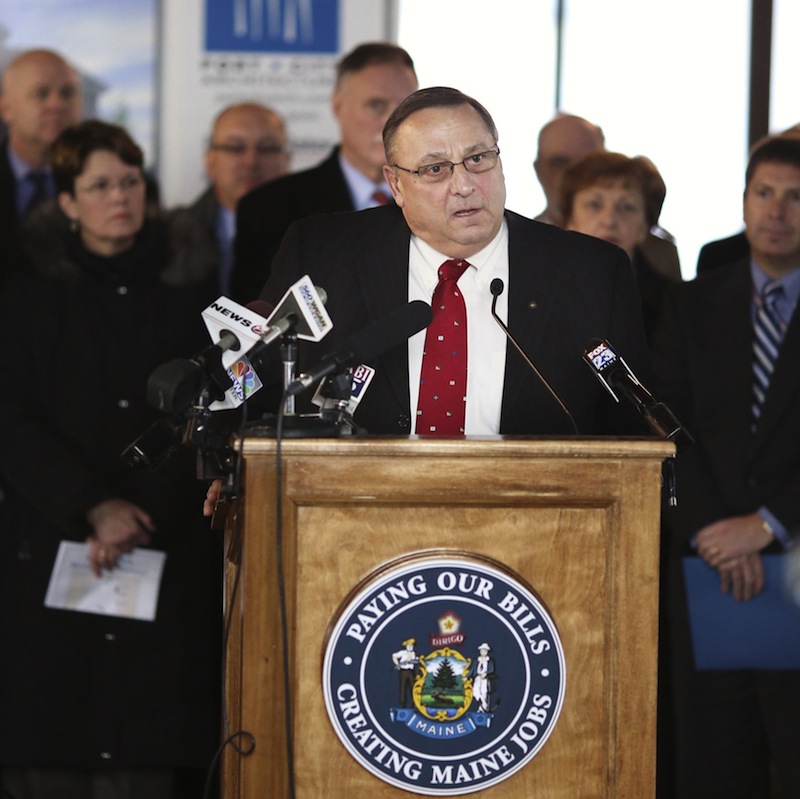AUGUSTA — Gov. Paul LePage vetoed a bill Monday that would bolster a state program to phase out toxic chemicals in children’s products.
Advocates said they would return to the State House on Tuesday to urge lawmakers to override the veto. The focus will likely be on Republican lawmakers who have helped sustain most of the governor’s vetoes this session, after initially voting to pass legislation.
L.D. 1181, sponsored by Sen. Seth Goodall, D-Richmond, would require manufacturers of 49 chemicals on the “high concern list” to report which products contain the chemicals, identified by the Maine Center for Disease Control and Prevention.
The bill passed in the Senate without debate and passed 108-37 in the House.
Monday’s veto came several hours after about 20 supporters of the bill rallied in the State House Hall of Flags. The group included parents who said they should know whether bisphenol-A, known as BPA, is used in children’s food packaging.
L.D. 1181 would require food companies with $1 billion or more in gross annual sales to report their use of BPA in packaging.
The bill was the subject of intense negotiating by lawmakers, state officials and the chemical industry. The LePage administration opposed the bill, saying it would cost the Department of Environmental Protection $1.47 million over the next two years through additional staffing.
Supporters of the bill then offered a version requiring less staffing.
The new estimated cost is more than $373,000 for two years. LePage has vetoed several bills in this session that required funding or assumed a department could handle additional duties with its existing staff.
Supporters of L.D. 1181 hoped the governor wouldn’t use that reasoning for the bill.
The administration has been criticized for its efforts in 2011 to repeal the Kids Safe Product Act.
More recently, a seven-month investigation by the Portland Press Herald/Maine Sunday Telegram showed that DEP staff members were under pressure to delay implementation of the priority chemical list.
In the 2½ years since LePage took office, the DEP has failed to put forth any toxins to add to the priority list identified by the Baldacci administration.
The DEP administers the Kids Safe Product program.
The governor has been widely criticized for saying in 2011 that the only side effect of BPA would be that some women would grow “little beards.”
The effort to regulate BPA in Maine is part of a national effort. Eleven states, including Maine, regulate the chemical’s use in food and containers in some manner, according the National Conference of State Legislatures.
The multistate advocacy effort began after efforts to regulate the chemical stalled in Congress several years ago. By 2012, the federal Food and Drug Administration banned the chemical from baby bottles and sippy cups.
The FDA’s current stance is that the “scientific evidence at this time does not suggest that the very low levels of human exposure to BPA through the diet are unsafe.” It later said the sippy cup ban was not because of the chemical’s safety.
If the veto is overridden, Maine will join Connecticut and Vermont with regulations of BPA that exceed federal law. In January, the Board of Environmental Protection voted to support a ban on BPA in baby food and infant formula containers. The Legislature has not yet approved the ban.
A DEP staff report said 92 percent of baby-food manufacturers that responded to a state survey said they have removed or are taking steps to remove BPA from packaging. It also said that studies show it’s unclear if BPA used in baby food lids comes into contact with the food.
Supporters of L.D. 1181 said Monday that large food manufacturers like Del Monte, Campbell’s and ConAgra are not required to disclose their use of BPA.
“As a consumer and a parent, I should have a right to know which foods contain this harmful chemical and which do not,” said Morgan Pottle-Urquhart, a mother from Bangor.
The proposal is opposed by members of the business community. On Monday, Ben Gilman, a lobbyist for the Maine State Chamber of Commerce, said the bill would unravel a bipartisan proposal that passed in the Legislature in 2011.
“Changing the rules again after clear evidence that the Kids Safe Products Act had been working is reinforcing the fact that this effort in Maine is part of a national agenda that seeks to use Maine as a laboratory for advancing extreme environmental policies,” Gilman said.
He urged lawmakers to uphold the governor’s veto when they take up the issue Tuesday.
Steve Mistler can be contacted at 620-7016 or at:
smistler@pressherald.com
Send questions/comments to the editors.



Comments are no longer available on this story